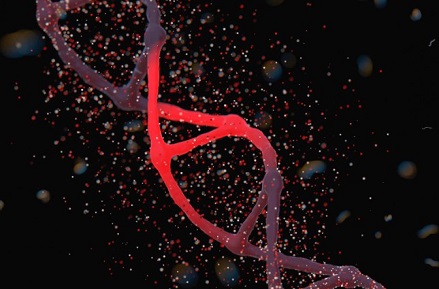COVID-19 News: IFNL1 rs30461 Polymorphism Is A Risk Factor For COVID-19 Severity
Nikhil Prasad Fact checked by:Thailand Medical News Team Jan 28, 2024 1 year, 10 months, 4 weeks, 1 hour, 34 minutes ago
COVID-19 News: The global impact of severe acute respiratory syndrome coronavirus-2 (SARS-CoV-2), causing the COVID-19 pandemic, has spurred intensive research efforts to unravel the complexities of the virus and its varying effects on individuals. While the majority of COVID-19 cases manifest as mild illness, a puzzling 20% of patients experience a severe course with outcomes that are not entirely understood by the scientific community. Mansoura University-Egypt and Mansoura University Hospital-Egypt have conducted a recent study that is covered in this
COVID-19 News report, delving into the molecular basis of COVID-19 severity. The focus of their research is on Interferons-lambda-1/Interleukin-29 (IFN-λ1/IL-29), a potent antiviral component, and the impact of IFNL1 single-nucleotide polymorphism (SNP) (rs30461) on COVID-19 severity.
 IFNL1 rs30461 Polymorphism Is A Risk Factor For COVID-19 Severity
Innate Immunity and Interferons
IFNL1 rs30461 Polymorphism Is A Risk Factor For COVID-19 Severity
Innate Immunity and Interferons
Innate immunity plays a crucial role in defending the host against SARS-CoV-2 infection. Interferons (IFNs) are key components of the innate immune response, exhibiting anti-proliferative and immune-regulatory functions against viral infections. IFNs are categorized into three groups: type I, II, and III. Type III IFNs, known as IFN-λs, include IFN-λ1/IL-29, IFN-λ2/IL-28A, IFN-λ3/IL-28B, and IFN-λ4. IFN-λs act as the front line of defense against respiratory viral infections, exerting potent antiviral effects with less pro-inflammatory impact compared to type I IFNs. Recent studies have emphasized the potential role of IFN-λ in anti-coronaviral immunity, and even Pegylated IFN-λ1 has shown inhibitory effects on SARS-CoV-2 replication.
IFNL1 (rs30461) Polymorphism and COVID-19 Severity
Host genetic factors play a significant role in determining clinical symptoms and disease outcomes in COVID-19. The study investigates the IFNL1 (rs30461) polymorphism, previously associated with autoimmune disorders and viral-induced inflammations, in the context of COVID-19 severity. While previous research has explored the influence of IFNL3 and -4 gene polymorphisms on SARS-CoV-2 infection, the specific impact of IFN-λ1 in predicting COVID-19 severity remained uncertain.
Methodology and Results
The cross-sectional study included 400 COVID-19 patients, categorized into 262 with mild symptoms and 138 with a severe course. The analysis involved assessing IFN-λ1/IL-29 serum levels and genotyping for the IFNL1 SNP (rs30461).
Surprisingly, the study found no statistically significant difference in serum IFN-λ1/IL-29 levels between mild and severe COVID-19 patients. However, the genotype and allele frequencies of IFNL1 SNP (rs30461) exhibited a significant difference, with the minor G allele posing a substantial risk for severe COVID-19 compared to the wild A allele.
The Odds Ratio (OR) for the minor G allele was reported as 2.1 (95% Confidence Interval: 1.5&
;ndash;2.9), indicating a significant association with an increased risk of severe COVID-19. Multivariate analysis further confirmed that the A/G and G/G genotypes of IFNL1 SNP (rs30461) were independent predictors of COVID-19 severity.
Implications and Future Perspectives
The study's findings shed light on the potential role of IFNL1 (rs30461) as an independent risk factor for COVID-19 severity. The identified genetic predisposition highlights the complexity of the host-virus interaction, emphasizing the need for personalized approaches in COVID-19 management. As predicting the progression of COVID-19 remains a critical challenge, the study suggests that IFNL1 SNP (rs30461) could serve as a valuable predictive biomarker for identifying individuals at higher risk of severe outcomes.
While the study adds a crucial piece to the puzzle, further research is warranted to explore the broader implications of IFN-λ1 in COVID-19 pathogenesis and severity. Additionally, incorporating genetic markers like IFNL1 SNP (rs30461) into predictive models could enhance the accuracy of prognostic assessments, aiding clinicians in making informed decisions about treatment strategies.
Ethical Considerations and Clinic-Demographic Characteristics
The study adhered to ethical guidelines, receiving approval from the institutional research board and ensuring informed consent from all participants. Clinic-demographic data revealed significant differences in age and gender distribution between mild and severe COVID-19 groups, underscoring the multifaceted nature of the disease.
Conclusion
In conclusion, Mansoura University's comprehensive study highlights the association between IFNL1 SNP (rs30461) and the severity of COVID-19. The identified genetic risk factor provides valuable insights into the intricate mechanisms underlying the diverse outcomes of SARS-CoV-2 infection. The study's findings not only contribute to our understanding of COVID-19 pathogenesis but also pave the way for the development of personalized therapeutic strategies based on genetic predispositions. As the world continues to grapple with the COVID-19 pandemic, research endeavors such as this play a pivotal role in advancing our knowledge and refining our approach to managing this global health crisis.
The study findings were published in the peer reviewed journal: Cytokine.
https://www.sciencedirect.com/science/article/abs/pii/S1043466624000036
For the latest
COVID-19 News, keep on logging to Thailand Medical News.
